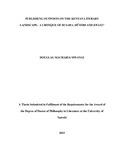| dc.description.abstract | Microfinance institutions (MFIs) play a vital role in the economic development of many
developing countries. Microfinance has a dual goal, that of attaining financial sustainability
and reducing poverty, simultaneously. The aspect of sustainability is crucial in poverty
alleviation because in order to have a long term impact, microfinance services need to be
provided on a continuous basis (Innovations in Microfinance, 2010). Majority of the
previous studies have concentrated on impact of MFIs on poverty alleviation in the society.
This has resulted in little or no research on factors affecting sustainability of microfinance
institution in Kenya. It is against this background that this study was conducted to establish
strategic factors affecting sustainability of micro finance institutions in Kenya with special
focus on Rafiki Deposit Taking Microfinance. The study sought to establish factors affecting
sustainability of micro finance institutions in Kenya with special focus on Rafiki Deposit
Taking Microfinance. A case study research design was adopted. The study hence considered
case study design suitable since data was gathered from a single source; Rafiki DTM and
used to represent, strategic factors affecting sustainability of micro finance institutions in
Kenya with special focus on Rafiki Deposit Taking Microfinance. The study employed face
to face interview as a primary data collection method. Content analysis was used to test data
that was qualitative in nature or aspect of the data collected from the open ended questions.
The study revealed that sustainability of microfinance institution is affected by various
factors including subsidies, breadth and depth of outreach, capital structure, capital
constraint, interest rates, government regulation as well as donor support. Some of these
factors contribute positively to the sustainability of the microfinance institution while others
contribute negatively. As the commercialization and securitization of microfinance is in
practice along with towering credit need from a large number of low income population, the
sector seems to be expanding with promising outreach. The study found that microfinance
institution is operationally self-sufficient but still depends on subsidies, which in the long run
result in crowding out. The study recommends that to hold the pace of outreach in a
sustainable way, microfinance institutions have to be very careful on its operation. | en_US |

